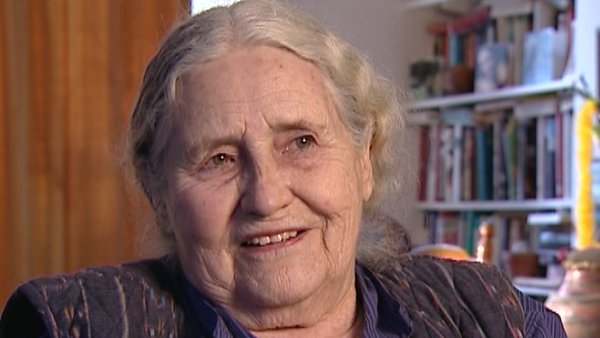NEXT STORY

How to write non-realistic fiction
RELATED STORIES

NEXT STORY

How to write non-realistic fiction
RELATED STORIES


|
Views | Duration | |
|---|---|---|---|
| 11. 'If Neanderthals, why not dwarfs and gnomes or whatever else?' | 506 | 03:32 | |
| 12. How to write non-realistic fiction | 532 | 02:34 | |
| 13. Feelings behind books | 444 | 03:31 | |
| 14. The Golden Notebook | 537 | 00:58 | |
| 15. Dealing with an alien child | 1 | 587 | 02:57 |
| 16. 'Ben is me!': why kids like Ben | 484 | 02:36 | |
| 17. The pleasure of finding things out | 365 | 01:51 | |
| 18. Solutions come in dreams | 450 | 04:38 | |
| 19. The sense of adventure is a gender thing | 1 | 389 | 02:10 |
| 20. Mara and Dann | 253 | 04:40 |


Okay, so there's Loren Eiseley, who was once a very famous writer, now for some reason he's dropped out of sight, and he describes how he is on a seashore in the dusk on a track – a rough track – and he's going slowly up into the village, and in front of him he saw a Neanderthal girl. And as I say it, I feel my back going cold; as I read it, my back went cold and my hair stood up on the back of my neck. She turned her head and looked at him, and he said this girl had the eyebrow ridges and the back to her head, and she could have been a Neanderthal. And he said – now we turning to reality – he said, well, this is a remote place from any town, this girl could have grown up and no one would have said anything more than, oh, Alice does have a funny head, doesn't she? They wouldn't have even have noticed, probably. But for him, an anthropologist, she was a Neanderthal.
So I thought, hang on a minute – you know, suddenly it starts... it starts to work. I was reading around about then articles about the Neanderthals... do we have their genes, or don't we? And then I've noticed that it's back in the papers again – people are saying that we do have their characteristics. One of these people said... one of these scientists said, in America... if she... he stands in a crowd and looks around, and he says, yes, that one, that one, that one, that one; he says he can see the characteristics in a crowd. I'm not saying he did or he didn't, but that is what he said. And by now I'm getting really excited because of what I'm thinking – if Neanderthals, why not dwarfs and gnomes or whatever else? Why not?
Now, this is where it really started. I'm in a dentist's waiting room, and I'm reading – you know, you do in a dentist's waiting room – the letters to Auntie Gertrude, and the letter goes like this. The letter says: I have to write to you, I have to talk to somebody. I'm not expecting you to solve my problems or do anything like that, but I just have to tell someone. I have four children, and my fifth child was born a little devil. Now, please note, this is religious language she's using throughout. She obviously didn't think it was religious. My fifth child was born a little devil. Before she came, our home was happy and harmonious, it was a little heaven. And then she arrived, and everything became devilish – the other children suffered. Sometimes, says she, I go into her room at night and I see that lovely little face on the pillow, and I long to put my arms around her and pick her up. But I know what would come up into my arms would be a hissing, spitting little devil.
Now, this one got to me, as they say, and I thought, now look, now I have to write it.
British writer Doris Lessing (1919-2013) was awarded the 2007 Nobel Prize in Literature. Her novels include 'The Grass is Singing', 'The Golden Notebook', and five novels collectively known as 'Canopus in Argos'. She was described by the Swedish Academy as 'that epicist of the female experience, who with scepticism, fire and visionary power has subjected a divided civilisation to scrutiny'. Lessing was the 11th woman and the oldest ever person to receive the Nobel Prize in Literature.
Title: 'If Neanderthals, why not dwarfs and gnomes or whatever else?'
Listeners: Christopher Sykes
Christopher Sykes is an independent documentary producer who has made a number of films about science and scientists for BBC TV, Channel Four, and PBS.
Tags: The Fifth Child, America, Loren Eiseley
Duration: 3 minutes, 32 seconds
Date story recorded: June 2007
Date story went live: 21 October 2011